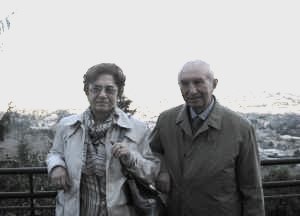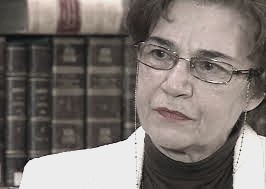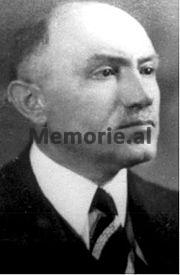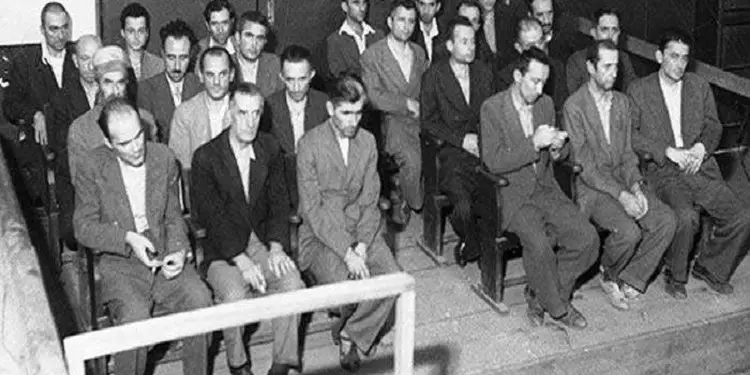From Blerina Goce
– “How our colleagues were arrested at the ‘Naim Frashëri’ Publishing House; Sami Murati, Robert Vullkani, Eqrem Biba, Xelal Ramku, Hysenil Dume and Natasha Pengili…”! –
Memorie.al / The well-known translator and editor in a confession about her work with translation, childhood, love and relationship with her husband Luan Omari, motherhood, etc. The arrests at the “Naim Frashëri” Publishing House and the memories of Bahri Omar…! She keeps fresh in her memory the period when she worked as an editor at the “Naim Frashëri” Publishing House. For a man who dealt with the book, the years of the dictatorship were not easy at all, on the contrary. However, Donika Omari knew how to enjoy even under pressure. The wife of Bahri Omari’s son, Luan Omari, she was also the daughter-in-law of Enver Hoxha’s grandson, but this fact does not seem to have greatly conditioned her intellectual activity. In one of her confessions, Mrs. Donika Omari talks about all these memories, as well as her love for literature and her family relationships.
Ms. Donika, you worked for many years at the “Naim Frashëri” Publishing House, as an editor and then as a manager in the foreign literature editorial office. How comfortable did you feel working there and did the fact of being a woman in a leadership position affect you?
I started working as a literary proofreader at the “Naim Frashëri” Publishing House in 1957. My friends told me: “how do you not get bored reading all the time”?! While I thought: “How is it possible, I read novels and get paid for it”, so I was getting paid for a pleasure. But later, the publication criteria became more and more strict, and, often, to the detriment of quality… and it is understood that being forced to work on a poor work is no longer a pleasure, but the opposite. In these cases, it is better to read a manual on agriculture than literary mediocrity.
Over the years, I was appointed editor and then editor-in-chief for foreign literature. There you had to work with great care, under the conditions of a censorship that was sometimes stricter and sometimes more liberal. It was possible that for a very small thing, for a phrase, for a name, the whole work could go to waste, apart from the consequences that would have the editor and the person in charge of the editorial office. Regarding the question you ask about being a woman in a leadership position, I can say that I have not had any problems. In the editorial office, we had understanding and respect for each other.
Have you ever suffered for the sake of censorship?
For some time, I worked as an editor in Albanian literature. There was a case when a book about Sevasti Qiriazi was published. I was the editor of the book. The author, Skënder Luarasi, had made a summary of her works and there he was mentioned as a patriot H. Mborja, who had been a fighter for independence, had also fought against Greek attacks, but later he was associated with Zogu, so he should not be mentioned in the book. The book went to the printer. There I don’t know who noticed it and it became a problem. As a result, I received as a punishment a severe remark with a note in my biography, which I still keep today as a reminder of a tough time.
The author of the book, S. Luarasi, came and apologized to me, saying: “You are young and could not recognize this name, I should have been more careful.” Then, in the foreign literature editorial office, I received some remarks from the press department of the Central Committee, but without any serious consequences. I remember that the publication of a collection of Gorky’s writings on literature was blocked. Gorky expressed such an opinion: “To be afraid of foreign influences means not to have faith in the working class of your country.”
They called us, the director, Thanas Leci and me, to the Central Committee of PPSh. Fortunately, the director defended the book and I was a little surprised at his courage. He said: “After all, this is true.” Then the book was allowed. We have had other cases of remarks, for some cover, as too liberal, etc., but which are not worth mentioning. Or, a strange, paradoxical observation was, for example, that we were publishing many books on the subject of dictatorships! Thus the Albanian dictatorship revealed itself.
Have you witnessed the punishment or dismissal of employees at the “Naim Frashëri” Publishing House, how did you experience each case?
The first arrest I remember is that of Sami Murat. They arrested him in the office. We were ordered not to leave the offices. Then the arrests followed over the years: Robert Vullkani, a talented young man, passionate about reading, with a solid knowledge of literature, especially of contemporary Western literature. When we were taken with the collective to visit the Museum of Security, we saw him, the charming Robert, presented as some dangerous criminal.
Then followed the arrests of Eqrem Biba, Xelal Ramku, Hysenil Duma…! We felt a special shock when the Russian Natasha Pengili was arrested, not only because of the sympathy she enjoyed, but also because she was a foreigner and we could guess how difficult prison would be for her. Then there were interned: Halil Qendro, Fatbardha Spahiu. Dismissed from Tirana, or from work: Jeton Ostreni, Ali Zotria, Gaqo Pisha, Stavri Kristo, Kika Sherko…! As for Kasëm Trebeshina, he could not extend his work as a translator for more than a year in the editorial office of foreign literature. And I’m not sure I’ve mentioned them all. This includes those arrested at the Encyclopedic Publishing House.
What do you think about literature written by women?
It does not matter if a work is written by a male or female writer. It is known that for century’s culture, literature, arts have been the property of men (with very few exceptions). Starting from the 20th century, more and more prominent and great names are appearing in female creativity. I have translated with the same pleasure, authors such as: Natali Sarrot, Natalia Ginsburg, Ana Gavalda, M. Jursënar, etc., as well as books by male authors. However, when I founded the “Elena Gjika” Publishing House, I set out with the goal of profiling it as a Publishing House that highlights the values of female literature.
And I published authors such as Dora d’Istria (the literary name of Elena Gjika), the first book in Albania about Mother Teresa, written by an Italian journalist, Gracia Deledën (Nobel Prize), Daccia Maraini, Simonë de Bovuarin, Maria Korti, P.L. Traversin (the creator of Mary Poppins), etc., as well as some Albanian authors, such as Eleni Laperin and Rajmonda Belli-Gjençaj. But the book market in our country is quite small and it is difficult to make profiles with a specific direction.
By translating this kind of literature, have you thought of writing it yourself?
Did I even write it myself? The translator is said to be an absent author. I have had enough to deal with some study on translation, on writers of the beginning of the Albanian novel, with journalistic writings, on social problems, writings on authors and works, etc. I have summarized almost all of these, adding unpublished writings, in the book “Interrupted Culture”, published in 2009.
Who were the women you felt closest to in your life and who directly influenced you?
Of course my mother. My sisters of course. But I had a close friendship with Fatbardha Spahiu. Smart, generous, open-minded, with natural nobility, I could trust Fatbardha with everything. I missed him a lot when his family was interned. Contacts then could not be maintained, I could only send him a French dictionary, ‘Larousse’, which he asked for. When she was able to come to Tirana, there from January 1992, after so many years that we had not seen each other, we had a meeting that could not be realized, because she died suddenly of her heart, news that deeply saddened me. Fatbardha was a special woman in all respects, and being with her, apart from pleasure, also gave you a lot with the example of her beautiful, characterful qualities.
While, on a broader level, getting to know the figure of Mother Teresa has been touching and inspiring for me. The first book I read about her, “Tereza e Calcutta”, by F. Zambonini, I immediately wanted to translate and publish in Albanian, which I did. But my enthusiasm and admiration for this extraordinary figure did not match the mindset of most of my countrymen, who asked: “What has he done for Albania”?! Due to prolonged isolation we were unable to see the moon behind our finger.
You are the wife of a well-known intellectual, such as Luan Omari, how did you meet, then fell in love…?
I was a student at the Higher Pedagogical Institute. As a building, we were together with Juridik. In the latter, Luan Omari was also a teacher. Even today I don’t know because we in Language-Literature also did the Constitution course in one semester, which was developed by the lawyer Isuf Alibali. But one day Luani comes to give the lecture. One of my Bulgarian friends noticed that he was looking at me like a lot and told me, but I didn’t listen. When we were about to graduate from college, we had to fill out a form. In agreement with the secretary of the faculty, Luani took it upon himself to ask me the questions about my form, thus finding a good opportunity to talk.
This was our first close acquaintance. Then we met other times. I was impressed by Luani’s behavior, education, and especially his great culture and exquisite taste. Even as a family, I had a special appreciation for the Omari family, for Bahri Omar, a name I had heard since I was a child, mentioned with respect by my father, and with shock, when the Special Trial was held. But later also from others, even with admiration. That’s how Luani and I got engaged, got married and gave birth to our daughter, Anila.
However, life is long and the relationship is often not what it was at the beginning…?!
Two spouses can be on the same page, in the main things, as it happens with us. We value more or less the same things for the values of life, for moral values, for art, literature, etc. Leo has helped me to have a deeper look, in evaluating things. He was more mature than me, more elevated than me, more formed and he has given me a lot in this regard. However, there are other things, seemingly small, that also create problems. For example, I am romantic; I like nature, the forest, the sea…!
He prefers the comfort of everyday life. Or, one of the joys of married life is doing joint projects. For example, for the arrangement of the house, Luani does not participate, he says; do whatever you want. And I can really do anything, at will, but it’s different when things are thought and done together. I say that this is the attitude of almost all men of his generation…! Even 50-60-year-olds. Maybe something is changing with the younger ones. Let’s hope.
Then you became a mother. How did this affect your life and relationship?
The birth of a child is a very big change in a woman’s life and a very big joy. As soon as I heard the baby’s first cry, the sweetest caressing words automatically came to my mouth. Even in this matter, in the birth, the growth of the child, the change that we still have in view, related to the family, is noticed. I wish that as a father, Luani was more present. He loved Anila very much and has been petting her until recently, as if she were a child.
But still, he was still drawn to his former life, to go out with friends. On the other hand, he left nothing unfulfilled for the girl. And what is more important, is the example he gave with his own life, without having the habit of giving advice, for moral integrity, for stable character, for sincerity in relationships with others…! And it is known that the example has much more effect than the words.
Your daughter is also dedicated in the field of books, studies. How does this fact make you feel?
I felt a great responsibility in raising the child. I thought that for every flaw that the child has, the parent is responsible. I was particularly careful to feed him well. But it was wrong, that I distracted his mind with fairy tales and magazines to make him eat even when he didn’t want to at all. Back then, we didn’t know much about the psychological impact that forcing a child to do things he doesn’t want to do at all. As for choosing a profession…? Anila, from a very young age, was very fond of books and recorded exactly what she read. There was also a special trend in the acquisition of foreign languages.
That’s why we made him learn Italian first with teacher Minerva, then French with professor Vedati, and again Italian with Pashko Gjeçi, who insisted on teaching him Latin as well. But it seemed to us that we were charging too much. At school, he started learning English, while later, he began to follow the German course. These languages have come a lot in her work, in her profession. That he chose Linguistics, because of our influence as parents. We started from her penchant for languages, her curiosity for tracing words, and her precision in writing. At first, scientific research seemed difficult to her, then she found herself well and is now a respected linguist. We are pleased that he has continued the family tradition.
As you also said, Luani is the son of Bahri Omar, as well as the grandson of Enver Hoxha. How did you know Bahri Omar, how much was said in your family about him, about his punishment by his own brother-in-law Enver Hoxha?
When I got engaged to Luani, the fact that he was Bahri Omar’s son, rather than Enver Hoxha’s grandson, was more important to me. Everyone is free to believe this today or not. Unfortunately, in our country it is still difficult to think objectively, everyone starts from himself. But that doesn’t matter to me.
How much talk was there about Bahri in your house and how was the relationship with Enver Hoxha?
When I became part of the Omari family, I could not keep Bahriu in my mouth; it seemed to me that I was touching a wound, still not closed. With any of their cousins, yes. They told me: “He agreed to become a minister during the time of the Germans, in order to influence the avoidance of reprisals, as had happened on February 4.” Luani’s aunt, Haxhoja, kept talking about him with kindness and longing. My mother-in-law, Fahria, always remembered it, crying on the day of the execution, but only in front of the maid. On the other hand, with Emver Hoxha’s family, relations were good, but this requires a long elaboration, and this is not the place.
Was there a fear of persecution?
My mother-in-law was afraid of persecution in the first years after the war, and it is unfortunate that, when Luani was studying abroad, she burned letters, writings, newspapers, magazines from the previous time, precisely because of this fear. He was scared even when he expressed any thoughts against the government at home. On the other hand, she never removed her husband’s picture from the glass sideboard in the drawing room. Today in the families of Bahri Omar’s sons, the books of his library are kept, an unfinished translation of the novel “Pol e Virzhini” by B. de Saint Pierre, a gold watch, a fountain pen…!
When was Bahri Omar convicted?
Bahri Omari was a deputy, publisher, publicist, minister and activist of the National Front. He was Enver Hoxha’s brother-in-law. He was born in 1888 in Gjirokastër and was educated in Istanbul for Political-Administrative Sciences. He participated in important patriotic and political movements. During the occupation of Albania by Nazi Germany, he became Minister of Foreign Affairs in the government of Rexhep Mitrovica on November 5, 1943-June 16, 1944.
For this position he was imprisoned. In 1945 he was arrested and sentenced to death by the Special Court. The trial took place in the “Kosova” cinema (today “Teatri Kombëtar”), while thousands of people followed it through the streets from loudspeakers placed everywhere in Tirana. The decision was delivered on April 13, 1945, at 10:00 a.m. He was executed the next day in a ditch at Kodra e Prifti in Tirana. Before the shooting, he called out to his friends: “Turn your head away from the guns! Traitors are killed behind their backs. We are not traitors. History will be the impartial judge”.
In love with foreign languages
He still remembers Miss Helena, the Swiss who taught him French. This is how his love for languages was born and continued with other languages, which he learned along with translation. “I got my first French lessons from Mademoiselle Helena Badel, a French-speaking Swiss, who had been a governess at the Vriones. Then the ‘Première année’ method was used. Then I started them again much later at the “Naim Frashëri” Publishing House, where, fortunately for us, the well-known writer and translator, Vedat Kokona, who was also a very good teacher, worked. With Professor Vedat, we used the newest method, ‘Mauger’. “Listen to French on the radio, that way you will keep the language alive”, he advised us. And he was completely right, because we lacked the opportunity to practice French, since we had no contact with foreigners, nor the opportunities that exist today to go to the country where the relevant language is spoken”, says Donika Omari.
When was Bahri Omar convicted?
Bahri Omari was a deputy, publisher, publicist, minister and activist of the “National Front”. He was Enver Hoxha’s brother-in-law. He was born in 1888 in Gjirokastër and was educated in Istanbul for Political-Administrative Sciences. He participated in important patriotic and political movements. During the occupation of Albania by Nazi Germany, he became Minister of Foreign Affairs in the government of Rexhep Mitrovica, on November 5, 1943, until June 16, 1944.
For this position, he was imprisoned. In 1945, he was arrested and sentenced to death by the Special Trial, which took place in the “Kosova” Cinema (formerly the “National Theatre”), while thousands of people followed him through the streets, from loudspeakers placed everywhere in Tirana. The decision was delivered on April 13, 1945, at 10:00 a.m. He was executed the next day, in a ditch at “Kodra e Prifti” in Tirana. Before the shooting, he called out to his friends: “Turn your head away from the guns! Traitors are killed behind their backs. We are not traitors. History will be the impartial judge”. Memorie.al















